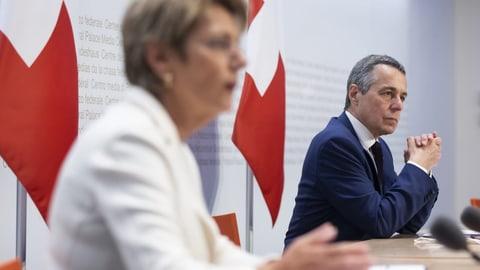The security situation in Afghanistan has steadily deteriorated since the Taliban took power. The British and Canadian governments have announced that they each want to take in 20,000 refugees. Switzerland is more reserved. Despite great pressure, the Federal Council has so far only granted around 230 people a humanitarian visa. Why doesn't Switzerland do more? Mario Gattiker, Director of the State Secretariat for Migration (SEM), comments.
Mario Gattiker
State Secretary for Migration
Open people box Close people box
The father of four was born in Zurich in 1956 and studied law. In 2001 he took over the management of the secretariat of the Federal Foreigners' Commission and became head of the new Integration Section in the Federal Office for Foreigners' Questions. Gattiker has been State Secretary for Migration since the beginning of 2015.
SRF News: Does the federal government assume that the 230 people with a humanitarian visa can still get to Switzerland?
Mario Gattiker: Of course that has priority for us. These 230 people are Swiss employees who live in Afghanistan and their family members. We bear a great responsibility and these people can rely on us to do everything we can to ensure that they can leave the country.
Today the Department of Foreign Affairs (FDFA) announced on Twitter that the Swiss evacuation flight had to be postponed. Do you know more about this?
This flight to Tashkent for the repatriation of Swiss nationals has been postponed for security reasons. This shows how difficult it is currently to get out of Afghanistan – even for foreign nationals.
The security situation is precarious on the way to Kabul Airport because there are many Taliban checkpoints. Since the situation is so tense, calls for larger reception campaigns for refugees are now completely unrealistic and inappropriate.

Can you estimate when the Swiss evacuation flight to Tashkent can fly?
We are closely monitoring the situation in Afghanistan and, as the FDFA has communicated, we will take these people with humanitarian visas out of the country at the first opportunity.
You say that the demand to take in more Afghans is untenable. This has been sharply criticized, Amnesty International, for example, speaks of an "unsustainable position of the Federal Council".
I think many people are now speaking out who simply misjudge the situation. It is currently not possible to leave the country and the way to the airport is extremely dangerous for people who are actually being politically persecuted. Right now, there is a need to help on the ground and respond to the most immediate humanitarian needs of those in need of protection.
Nevertheless, the Federal Council pointed out the possibility of a humanitarian visa on Wednesday.
Switzerland no longer has a representation in Afghanistan and we therefore lack the local logistics to issue such visas. It is conceivable that such humanitarian visas can be claimed in neighboring countries, as we saw in the Syrian crisis. But bringing people from Afghanistan to Switzerland is currently logistically practically impossible.
One demand is that Switzerland, as in the Syrian conflict, should lower the hurdles for these humanitarian visas so that more people can benefit from support. Is that an option?
We will continuously monitor the situation and take any further measures. During the Syrian crisis, a small Syrian community was able to bring relatives to Switzerland thanks to visa facilitation. If you were to do that for Afghanistan today, we would have tens of thousands of people in this rapidly growing community in Switzerland. That would be logistically unmanageable. And I don't think it would be the right answer either, since many of these people are already living as refugees in Pakistan or Iran.
Does this mean that Switzerland is not lowering the visa requirements because otherwise too many Afghans would come here?
No, the point is that it makes sense to protect the most vulnerable people first. Not just all relatives, as not all of the 30 to 40 million Afghans are equally at risk. When granting protection, the community of states must pay attention to the endangerment of people, otherwise injustices will arise.
Another possibility would be for the people concerned to be able to submit such a request digitally to the SEM in the future. Would you be willing to do this?
Of course, this is already happening. But we can only deal with such requests when we reach the people and know where they are. However, logistically this is hardly feasible without the Swiss authorities on site.
Oliver Washington conducted the interview.



